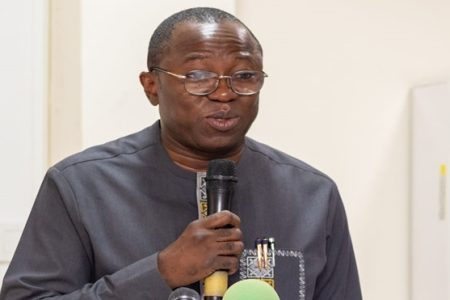Ghana currently has just six surgical, obstetric, trauma, and anaesthesia (SOTA) physicians per 100,000 people, far below the West African Health Organisation’s (WAHO) recommendation of 20 physicians per 100,000.
These professionals are unevenly distributed across the country, with a significant lack of specialists at the district level.
Launch of the National Surgical Obstetric and Anaesthesia Plan
Dr. Opoku Ware Ampomah, Chief Executive Officer of Korle-Bu Teaching Hospital, highlighted this issue during the launch of the National Surgical Obstetric and Anaesthesia Plan (NSOAP).
The plan is designed to ensure equitable access to safe and high-quality SOTA care for Ghanaians over the next five years (2025-2029), addressing gaps through targeted investments in infrastructure at all hospital levels—primary, district, secondary, regional, and tertiary.
Goals and cost of the NSOAP
The NSOAP outlines goals, strategic objectives, interventions, activities, and indicators related to infrastructure, workforce, service delivery, financing, information management, governance, and leadership.
Its implementation is projected to cost approximately $503 million.
Improving infrastructure and expanding workforce
Key elements of the plan include rehabilitating surgical, obstetric, and anaesthesia infrastructure, expanding professional training for SOTA specialists, and improving service delivery nationwide.
It emphasizes the equitable distribution of health professionals and retention initiatives, especially in marginalized areas.
Leveraging technology and addressing disparities
The plan also highlights the importance of leveraging technology for improved service delivery and engaging communities through outreach programmes.
It aims to resolve disparities in access to care by addressing neglected surgically treatable conditions such as structural birth defects and gender-based violence cases.
Alignment with global health initiatives
The NSOAP aligns with the World Health Assembly Resolution 68.15, adopted in 2015, which calls for countries to increase emergency and essential surgical care as part of achieving universal health coverage (UHC) by 2030.
Addressing the silent epidemic of trauma
Dr. Ampomah emphasized the timeliness of the policy, stating that Ghana is currently performing only 30% of the necessary surgical operations due to under-resourcing, inaccessibility, inadequate human resources, and high costs.
He also highlighted trauma as a “silent epidemic,” causing more deaths than COVID-19, particularly among people in their prime productive years.
Multi-Stakeholder collaboration for successful implementation
Mr. Alexander Akwasi Acquah, Deputy Minister of Health, who launched the initiative, stressed the critical importance of the NSOAP in addressing surgical care access at all healthcare levels.
He called for multi-stakeholder collaboration, public-private partnerships, and strong teamwork to ensure the plan’s effective execution.
Teamwork for success
Dr. Ruben Ayala, Chief Policy and Advocacy Officer at Operation Smile, the global non-profit organization that funded the document’s development, echoed the need for teamwork to ensure the successful implementation of the NSOAP.
- Enterprise Life launches improved education investment solution - 31 March 2025
- Access Bank Ghana launches “Fa Ketewa Bɛgye Kɛseɛ” promo - 31 March 2025
- President Mahama Calls for unity at Eid Al-Fitr celebration - 31 March 2025

